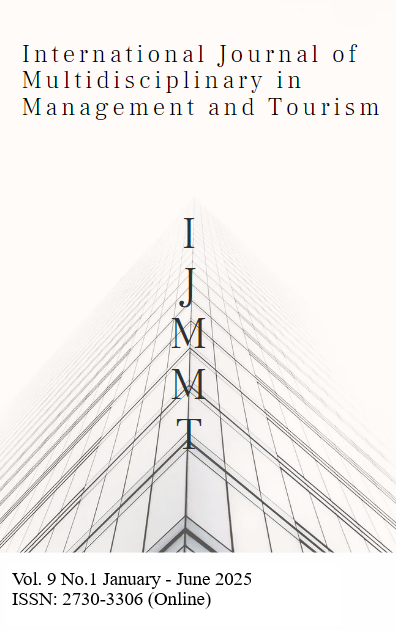The Need for Organizing Activities to Promote the Teaching of Thai as a Foreign Language for Chinese Students at North Bangkok University
Main Article Content
Abstract
Organizing activities to support the teaching and learning of Thai as a foreign language is crucial, as it enhances opportunities for learners to practice Thai in authentic contexts and real-life situations, develops communication skills, and promotes a deeper understanding of Thai culture. These factors play a significant role in enabling Chinese students to learn Thai more effectively. This research aimed to (1) study the needs for organizing activities to promote the teaching of Thai as a foreign language for Chinese students at North Bangkok University; (2) explore the preferred types of activities and challenges in learning Thai among these students. The sample group consisted of 40 Chinese students enrolled in the Thai Language for Communication program for the academic year 2023 at North Bangkok University's Rangsit Campus. They were selected through cluster sampling. The instrument for data collection was a questionnaire, and data were analyzed using descriptive statistics and content analysis. The research findings are as follows: 1. There is a significant need for organizing activities to promote the teaching of Thai as a foreign language. 2. Most students prefer learning through activities outside the classroom rather than inside the classroom. 3. The major challenge faced by students is speaking Thai, and they desire more activities that help them use the language in daily life situations. The most popular activities among the students include learning Thai through songs and cooking Thai food. 4. The main problem encountered by students during these activities is the difficulty in understanding spoken Thai. This research presents guidelines for designing learning activities to promote Thai language acquisition among foreign learners, with a learner-centered approach. The findings can be applied to instructional practices through interactive language training activities, conversation workshops, language partner programs with Thai students, and role-playing in real-life situations. Additionally, cultural learning activities, Thai festival events, cultural site visits, and learning through Thai drama and media contribute to enhancing students' learning efficiency and improving their academic achievement.
Article Details

This work is licensed under a Creative Commons Attribution-NonCommercial-NoDerivatives 4.0 International License.
References
Angwatanakul, S. (1997). Methods of teaching English (4th ed.). Chulalongkorn University Press.
Atchara, J. (2014). Greetings in different cultures. Post Today. https://www.posttoday.com /international-news
Chaichana, T., Masantiah, C., & Tippayakulpairoj, D. (2024). The study of English speaking anxiety of upper primary school students at Wichutit School. Interdisciplinary Academic and Research Journal, 4(3), 945–958. https://doi.org/10.60027/iarj.2024. 276464
Incwaran. (2021). If not by greeting, how do other countries greet each other? Mangozero. https://www.mangozero.com/how-to-greeting/
Jaengsaengthong, W., & Tawanna, T. (2024). Development of learning achievement in the English course on present simple tense by using a task-based learning model for students of the 6th level of primary education. Interdisciplinary Academic and Research Journal, 4(4), 779–794. https://doi.org/10.60027/iarj.2024.277210
Kunlawanish, P., & Panmetha, N. (1994). Grammar. In Thai language 3 (6th ed.). Sukhothai Thammathirat University Press.
Petchrung, K. (2012). The value of the Thai language. Saitharn Wannasilp, 2.
Phurattikul, S. (2015). Active learning teaching management. Faculty of Agricultural Technology, Burapha University, Sa Kaeo Campus.
Plangsorn, R. (2022). The science of teaching Thai as a foreign language (3rd ed.). Chulalongkorn University Press.
The Royal Institute. (2011a). Culture. Royal Institute Dictionary. https://dictionary.orst.go.th
The Royal Institute. (2011b). Tradition. Royal Institute Dictionary. https://dictionary.orst. go.th
Yamo, P., Klinklan, K., & Kosenarak, B. (2024). Lesson learned from the initial phase of the development process of CEFR-based Uttaradit Rajabhat University test of English proficiency. Interdisciplinary Academic and Research Journal, 4(1), 793–804. https://doi.org/10.60027/iarj.2024.273940
Zhiyuan, R. (2012). Cultural adaptation of Chinese students in Thailand: A case study at Burapha University. Academic Journal of Humanities and Social Sciences Burapha University, 20(34), 185-201.

